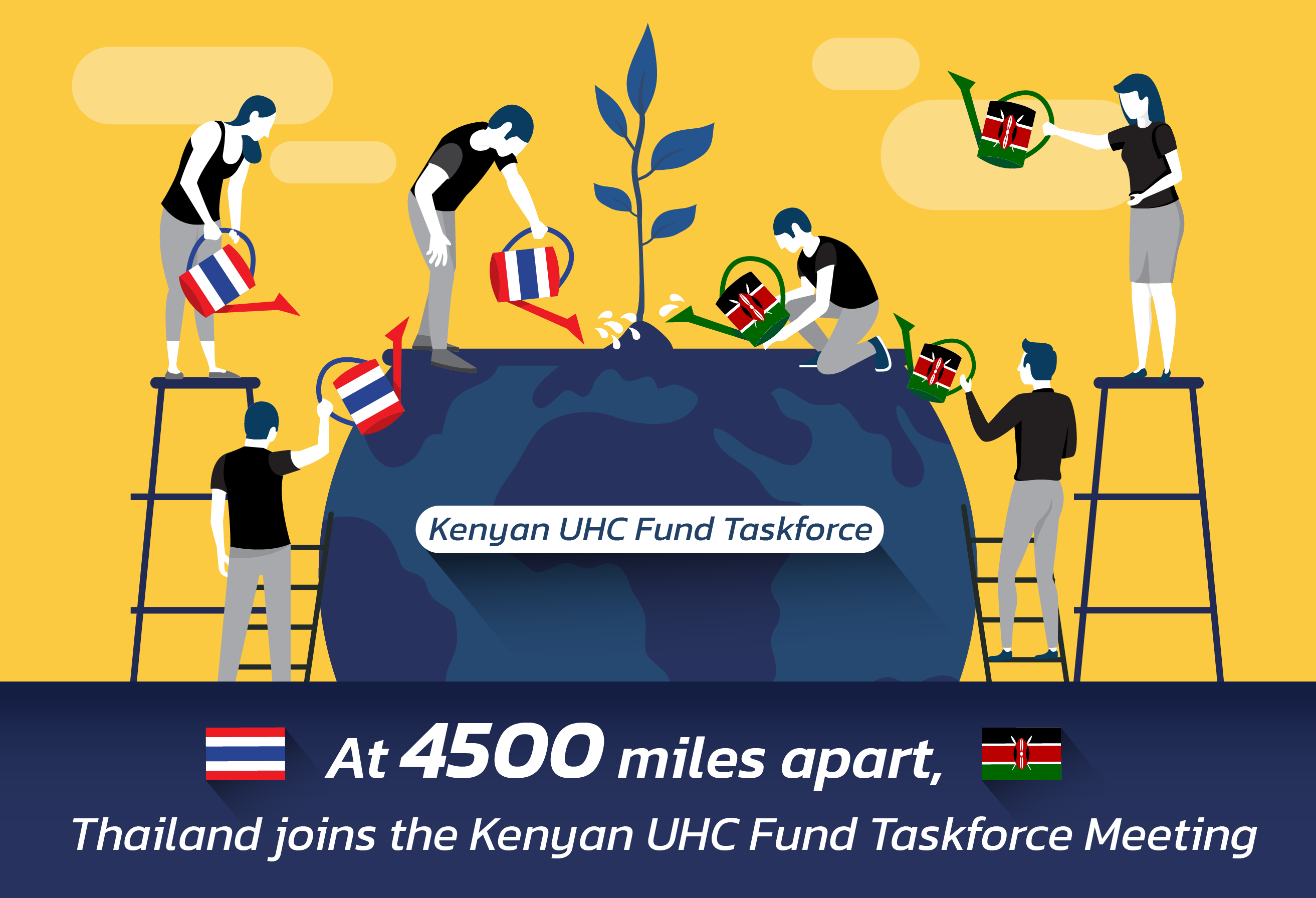Overcoming Barriers: Financing and Service Delivery for Vaccination in Fragile and Conflict-Affected States


On 21st September 2020, HITAP joined representatives of the Ministry of Public Health (MOPH) Thailand and the National Health Security Office (NHSO) at the Kenyan Universal Health Coverage (UHC) Fund Taskforce meeting chaired by Mr. Geoffrey Malombe from National Treasury and Dr. Mercy Mwangangi, Chief Administrative Secretary (CAS) at Ministry of Health (MOH). The UHC Fund Taskforce has been convened by the Kenyan MOH to ensure there are sufficient funds and resources to drive the UHC agenda. Dr. Suwit Wibulpolprasert (Former Deputy Permanent Secretary of the MOPH) and Dr. Jadej Thammatach-aree (Deputy Secretary General of the NHSO), were among those who joined the meeting to answer questions on UHC in Thailand.

Dr. Suwit Wibulpolprasert and Dr. Jadej Thammatach-aree answering fruitful questions on Thai UHC at the UHC Taskforce Fund meeting.
There was a wide range of questions to the speakers including: how the Thai system of UHC is sustained, how emergency care is managed, and how funds flow to health facilities among others.
In response to a question on how Thailand balances cost and quality within their UHC management, Dr. Suwit asserted that balancing cost and quality is tricky. Dr. Jadej added that NHSO, the strategic purchasing body of the Universal Coverage Scheme (UCS), conducts a series of satisfaction surveys with patients as a means to help improve quality.
Dr. Suwit also explained that Health Technology Assessment (HTA) has been institutionalised in Thailand which helps determine which high-cost technologies should be included in the benefits package. High-cost technologies are exploding and HTA helps inform policy makers on the technologies that deliver value for money in the Thai setting. He then commended members of the taskforce for sowing the seeds for HTA in Kenya; a key area for collaboration under the Memorial of Understanding (MOU) between the Kenyan MOH and Thai MOPH. HITAP has been working with the MOH, KEMRI Wellcome Trust Programme (KWTRP) and partners to build HTA capacity in Kenya, with the support of the International Decision Support Initiative (iDSi), a global network of priority-setting institutions,
Dr. Suwit outlined that a key contributing factor to the success of UHC in Thailand is that it “belongs to the people”. UHC is an exceedingly popular policy amongst the Thai people and every government since its passage has continued with the scheme. A notable way that Thailand facilitates public involvement is with the inclusion of civil society representatives in the governing board of the NHSO. This ensures that the voice of the public is represented loud and clear. The governing board consists of 30 members and five of which are from civil society organisations including patient groups.
Dr. Mercy Mwangangi, CAS at the Kenyan MOH, concluded by thanking the speakers for highlighting key principles for moving UHC forwards such as the strengthening of Primary Health Care (e.g., expanding a network of community health volunteers), the value of starting small when designing the UHC system, and putting the people at the centre of the UHC journey.
As the MOU between the Kenyan MOH and Thai MOPH approaches the 18-month mark, the meeting underlined the value of this collaborative partnership and unlocking further potential of south-to-south cooperation. Thailand was at a similar GDP level as Kenya when they implemented UHC back in 2002 and this meeting was an invaluable opportunity for the taskforce to learn from a country that undertook their UHC journey at a similar starting block.
Even at a 4500-mile distance, the Thai MOPH remains as delighted as ever to be able to support Kenya’s journey towards UHC. This meeting addressed health financing of UHC at large and we look forward to discussions on more specific topics in the coming months. Many thanks to the UHC Fund Taskforce for inviting us and to Dr. Suwit, Dr. Jadej, Dr. Yot Teerawattananon, Dr. Wanrudee Isaranuwatchai, Dr. Waraporn Suwanwela, Ms. Wilailuk Wisasa, and Ms. Saudamini Dabak, for representing the Thailand team in this meeting.